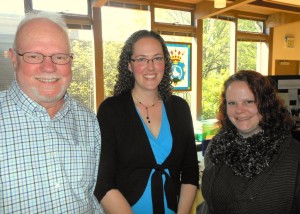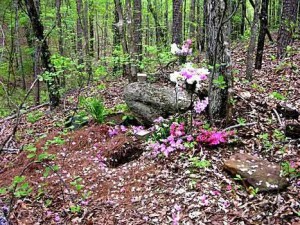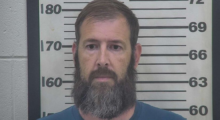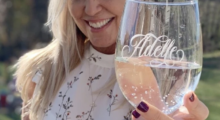Today is part two (read part one) of SevenPonds interview with Nora Menkin, Managing Director of The Co-op Funeral Home of The People’s Memorial in Seattle. The Co-op Funeral Home of People’s Memorial is one of the only cooperative funeral homes in the country, and here Nora talks about its origins, how it works and how she became involved.

Credit: Nora Menkin
Ellary: As Managing Director of The Co-op Funeral Home of People’s Memorial, are you personally involved in helping plan the funeral services for individuals who have passed away? Do you personally meet with families to plan services?
Nora: Yes, I meet with families in addition to running the day-to-day operations. We also have two other licensed funeral directors on staff, and they do the majority of that work. There are three of us that are licensed and meet with families. I also have one intern that comes in a couple hours a week and is learning that part of the business as well. But we all do a whole lot more work than a funeral director at a traditional home does. Last year we served 840 families. A traditional funeral home would have much less volume than that and they would have far more staff.
Ellary: Aside from the affordability of a funeral cooperative, what do you think the benefits of the funeral home being member owned are for its members?
Nora: Well, they know that we are serving them for their benefit and that of the community. We’re not reporting to shareholders; we’re not reporting to an owner who is relying on the income for their livelihood. It’s really about accountability and who we are here for. And we’re here to serve our members.
At the same time, we want to have a competitive and fair business model too. We compensate our employees well and make sure that everyone has a good standard of living. We’re not the cheapest funeral home in town. Some places definitely have lower prices than us. But people that come to us know exactly what they’re going to get. Whether they’re getting cremation or a full, traditional funeral service, we treat everyone exactly the same. Whereas other places, many kind of write people off with, “Oh, you’re just cremating. I’m not going to really talk to you again.”
Ellary: What was so impactful about Jessica Mitford’s book “The American Way of Death” when it was published in the sixties?
Nora: I think a lot of people at that time had an idea that the funeral industry was predatory. But because people only plan one or two funerals in their lives, they couldn’t see the industry for what it is. It’s not something that people want to dwell on either. They want to get it over with and be done.
Then Jessica Mitford said, “This is how this industry is treating people, and this is what people have come to expect, but we deserve better.” It was a rallying cry for people to start thinking about what was important to them. Rather than be told what to do, they wanted to be able to make their own choices and not go broke going through this thing that everyone goes through at some point.

Credit: dexknows.com
Ellary: Would you call “The American Way of Death” sort of the beginning of the funeral consumer advocacy movement?
Nora: Actually, the People’s Memorial Association predates the publication of that book. The People’s Memorial Association has been around since 1939, so there were definitely rumblings of discontent before it came out. And there were separate home memorial societies and funeral societies, but they definitely were on the fringe.
But when “The American Way of Death” came out, it brought the funeral industry’s practices into the light, and that certainly laid a foundation. A whole lot more memorial societies opened up around the country, and there was definitely a rallying cry to get the Federal Trade Commission involved. People felt that we needed to have some laws governing the industry’s shady business practices, and this led to the FTC’s passage of the Funeral Rule in 1984. After that, funeral homes had to charge the richest man in town the same amount they charged the poorest man in town. They couldn’t pad their books based on what kind of suit the guy was wearing when he walked in the door.
So that was big, but after the Funeral Rule went through, people got complacent again. So, now we’re kind of in this new movement, with the baby boomers realizing that death is something they need to have a relationship with in their daily lives. They’re also realizing that that law is now outdated because it doesn’t say anything about posting prices on websites or giving prices over email because those things didn’t exist in 1984. So funeral homes can kind of cloak their prices and say, “Well it’s not price that matters, it’s the quality of the service you receive.” But, in fact, the cost matters!
Ellary: I see that you’ve given talks at places such as Reed College. Is that something that you do regularly — speak at green burial or funeral consumer advocacy conferences or conventions on alternative funeral practices?
Nora: Well it’s a very small world, and if someone has a forum like that I’m happy to speak about what we do. The one at Reed College actually gained some notoriety. It was really well attended and it was obvious that there was a hunger for this kind of knowledge that wasn’t being provided anywhere else.
The People’s Memorial Association also does workshops and seminars on a pretty frequent basis. For instance, we have a program called “Got Your Ducks In a Row?” In a couple hours, we have an estate planning attorney, an advanced directives specialist and a funeral planning person (which is usually me) go over issues about end of life stuff. The program is available to anyone who wants to attend. We suggest a $10 donation, but no one has to pay. We believe that the more information you have, the better equipped you are to make decisions around these difficult times.

Credit: cometappears.blogspot.com
Ellary: Do you have any thoughts about what you want for your own funeral?
Nora: When I first came here, I thought I wanted to be cremated. My stance was that what happens to the body after I’ve left it doesn’t matter. But now I’ve really come around and decided that I want my body to be productive, so I really love the idea of a natural burial — a green burial. I would like to be placed somewhere that helps conserve the land. I love the idea of conservation natural burial, especially living in an urban setting. If we could designate an area of forest to make a conservation cemetery to make sure that it’s never torn down or developed, that would be my ideal situation.
Ellary: Post-mortem eco-activism.
Nora: That’s me.
Ellary: Is there anything else you’d like to say about The Co-op Funeral Home, the People’s Memorial Association or about the funeral consumer advocacy movement?
Nora: I’d recommend looking into the Funeral Consumers Alliance if you haven’t. They are the national organization that we are the Washington State chapter of. They were formed in 1954, so the People’s Memorial Association predates them, but they do wonderful work. We’re by far the biggest and strongest organization of our kind, but there are all kinds of affiliate sisters that are doing what we do on a very small scale. They might just do price surveys for local people so people know that they’re comparing apples to apples when they’re price-shopping for funerals. Many are doing advocacy work — keeping an eye on the state governments and making sure they aren’t passing laws that are consumer averse. So that’s worth looking into!
Ellary: Thanks for the information, Nora. I’m sure our readers will appreciate your insights.
Nora: You’re very welcome.

 What Is The Benefit of A Member Owned Cooperative Funeral Home? An Interview with Nora Menkin, Part Two
What Is The Benefit of A Member Owned Cooperative Funeral Home? An Interview with Nora Menkin, Part Two


 Funeral Home Owner Chris Johnson Spending Halloween in Jail
Funeral Home Owner Chris Johnson Spending Halloween in Jail
 Our Monthly Tip: Toast a Loved One with a Personalized Glass
Our Monthly Tip: Toast a Loved One with a Personalized Glass
 My Cousin’s Death Taught Me the Meaning of Life
My Cousin’s Death Taught Me the Meaning of Life















Greqt goods from you, man. I have be mindful your stuff prior to and you are simply too excellent.
I actually like what you’ve got here, really like what you’re stating and the
way in whnich wherein yoou are saying it. You’re making it entertaining and you continue to care for to
kee it smart. I can’t wait to rad far more from you. That is actually a
great website.
Report this comment
Great information!
I realize some of this was transcribed from an interview over the phone, so I want to point out that the ducks in a row program discusses advance directives, not “advanced” directives. The directives are done in advance; in other words, before need arises. There are no beginner directives or intermediate directives.
Report this comment
Nice articles – very informative. I’m very impressed with Ms. Menkin! She’s a capable, intelligent, organized, and compassionate person and did a beautiful job helping us plan a graveside ceremony for my elderly mother several years ago. My mother was staying with us in Seattle her final years, away from her long-time home in the mid-west. At 105, she had outlasted all her close friends and neighbors and wished to be buried here. However, we needed a preacher, a cemetery, etc. Nora guided us gently through all we needed. She recommended a minister who not only spent 2 hours interviewing with the family and getting to know all about my mother, but he then delivered a beautiful tribute to her at the family service. We were able to have a heartfelt and personal goodbye, and Nora and PMA were invaluable in making that happen . Thanks for the articles and for Nora!
Report this comment